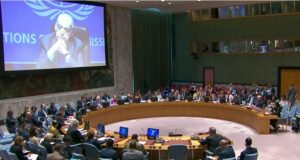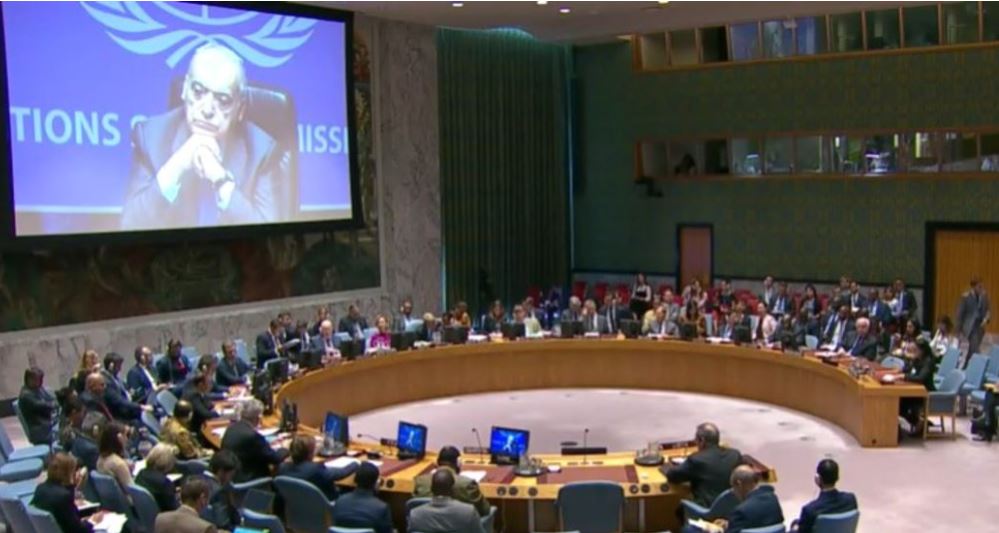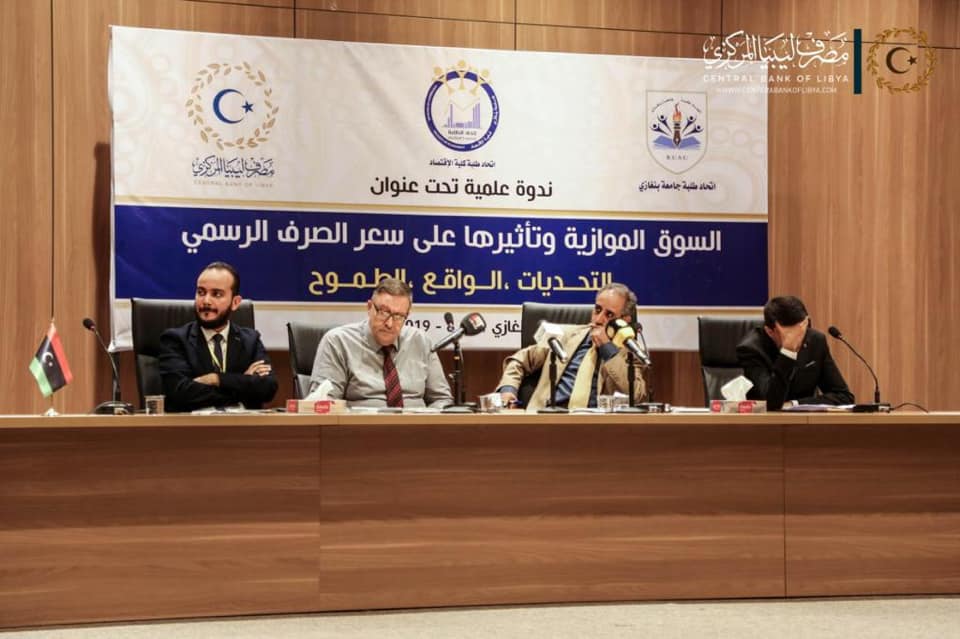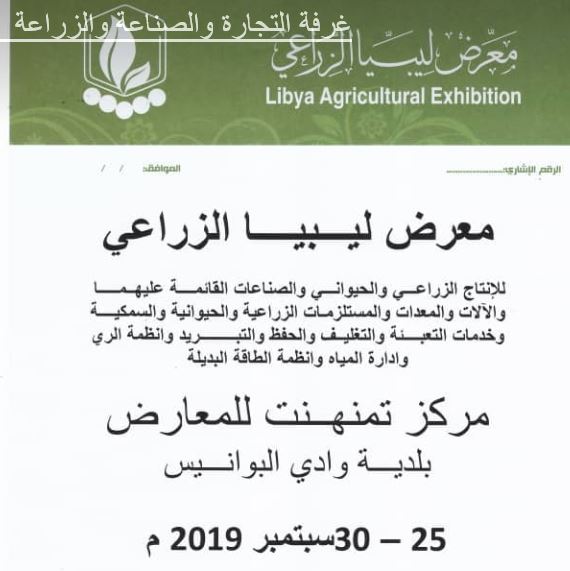By Sami Zaptia.

London, 5 September 2019:
In his latest update on the Libyan situation to the UN Security Council yesterday, the head of UNSMIL, Gassan Salame said that there has now been over 100 civilian deaths, 300 injured and 120,000 displaced as well as fighter deaths ‘‘in the low thousands’’ as a result of the war launched by Khalifa Hafter to ‘‘liberate’’ Tripoli on 4 April this year.
Salame condemned the eastern-based Interim Government for setting up parallel unelected councils, called for the freeing of and the investigation into the disappearance of House of Representatives (HoR) member Siham Sergiwa.
The UNSMIL head said that the UNSC arms embargo on Libya has been ‘‘ineffective’’ and that fighters on both sides were ready for peace as they were exhibiting ‘‘combat fatigue’’. He added that ”The idea that war should be given a chance and that a military solution is at all possible is quite simply a chimera”.
Ultimately, Salame said that without the cooperation of key external actors (popularly believed to be France, Egypt, UAE, Turkey and Qatar), the Libyan conflict will continue.
Here is the full text of his presentation:
Mr. President,
Allow me to congratulate the Russian Federation for its Presidency of the Security Council this month.
Mr. President,
Members of the Security Council,
I am grateful for the Council’s expression of support on the occasion of the emergency session held on August 10, the day of the Benghazi bombing which killed three United Nations staff members.
I would like to pay tribute to our colleagues and friends Clive Peck, Hussein El-Hadar, and Seniloli Tabuatausole whose lives were cut short by that cowardly attack. Clive and “Tabs”, as he was known, travelled the world as UN security personnel, enabling the vital work of peace making and delivery of life-saving humanitarian assistance. Hussein had been with the Mission for nearly six years and was due to be married this month. As United Nations staff members, their sacrifice for the benefit of Libya and of all Libyans will not be forgotten.
I also want to pay tribute to our two staff members who are still recovering from serious injuries and the eight other injured Libyan civilians. In parallel to the United Nations internal inquiry into the incident, we are requesting Libyan authorities to cooperate with us in the investigation and to swiftly bring to justice the perpetrators. I would like to call upon Member States to provide the UN with any information they may have on this horrific attack.
The United Nations will remain in Libya. Naturally, we will work to mitigate further the risk to our personnel and operations, but the tragic irony is that the worse the situation on the ground becomes, the greater the need for our presence, mediation efforts, and provision of humanitarian assistance. The Benghazi hub remains open and a limited number of UN staff members continues to operate from there. A longer-term position concerning the hub will only be taken once a fuller assessment of the security situation in the city and associated risks has been taken.
Mr. President,
Today marks five months to the day since General Haftar launched his offensive to seize control of Tripoli, halting an active and promising political process and returning the country to renewed conflict. Since the 4th of April, the conflict has spread geographically and has exacted a heavy toll on civilians and those fighting. To date, more than 100 civilians have been killed and over 300 injured, and 120,000 civilians have been displaced. There are no confirmed figures for the total number of fighters who have died so far, but anecdotally the figure appears to be in the low thousands. Yet another generation of young Libyan men are spilling their blood on the battlefield when their skills could better be used to rebuild their country.
I would like to draw your attention to the shelling of airports. A disaster was closely averted last Sunday when a plane full of returning pilgrims from Mecca was miraculously not hit by a series of shells fired at Mitiga airport. Seven people were injured. I would ask for the Council’s strong support in condemning such indiscriminate shelling which threatens the lives of substantial numbers of civilians.
The UN have consistently responded to GNA requests that we inspect sites that have been subject to attacks. We have conducted multiple visits to Mitiga airport, one to Zuwara airport, and to other civilian sites including the Tajoura Detention Centre that have been subjected to either air strikes, drone attacks or have been hit by various projectiles since the 4th of April. The reports from all of these visits are shared with the Panel of Experts and when needed with the ICC as well.
Mr. President,
The situation in the southern town of Murzuq continues to be grave. Over one hundred people have been killed and many more injured in fighting between the Tebu and Ahali communities; this includes the precision airstrikes on 4 August targeting a gathering of Tebu representatives in which over 40 were killed. Thousands have been displaced as homes and businesses have been looted and burned. This local conflict risks taking on a national dimension as each party mobilises national actors behind them.
Elders from outside Murzuq have tried to mediate an end to the violence but unfortunately without success. On 24 and 25 August, following a number of preparatory meetings, I convened separate sessions with Ahali and with Tebu representatives to discuss: ending the violence, the return of the displaced and to initiate a discussion on how the roots of grievances can be addressed to prevent future tensions again turning into serious conflict. The UN Humanitarian Agencies have delivered assistance to 1,500 families affected by the violence in Murzuq.
Reestablishing local civil peace is an integral part of our mission. It is particularly true in the south where the events in Murzuq may spill-over to other cities where different tribes and ethnic groups have until recently lived in peace.
Local peace also needs to be built on stable local authorities. I remain concerned by attempts of the unrecognised eastern government to assert control over local municipalities. The efforts by the interim government to conduct parallel municipal elections or establish appointed municipal steering committees, including in municipalities where elected councils are already in place, are exacerbating local conflict and fragmenting local governance structures. This is unfortunate given that local governments are the most resilient institutions and are expected to play a crucial role in reconciliation, delivery of services and reconstruction and Libyans broadly agree on the need for further decentralization.
Mr. President,
Kidnappings and enforced disappearances continue across the country. I am very disappointed to report that there has been no news regarding the fate of the House of Representatives member Siham Sergewa since she was abducted from her home in Benghazi on the 17th of July. I reiterate the call on the authorities in the east to investigate the enforced disappearance of Madam Sergewa and make the findings known. These authorities are responsible for the safety and security of the people under their territorial control and they must take all necessary steps to clarify her whereabouts. The voices of Libya’s elected representatives cannot be allowed to be quashed through intimidation or enforced disappearance. I welcome the continued and loud support of the many member states demanding Ms. Sergewa’s swift return and I again reiterate the absolute need for those found responsible for violations of international humanitarian law and international human rights law to be held accountable before the competent bodies.
Mr. President,
Following my call for the gradual and progressive closure of all detention centres holding migrants and refugees, on the 1st of August the Minister of Interior ordered the closure of three of these centres. The United Nations submitted a contingency plan to the Government of National Accord on alternative options to detention. This plan includes release into urban settings with provision of assistance, provision of necessary health care, access to the labour market, and identification of durable solutions outside Libya. These centres need to be closed through a gradual and deliberate process in which the relevant UN agencies are provided the necessary means to assist this vulnerable population.
Despite these calls and Government claims to have shuttered the Tajoura Detention centre – which was the site of the deadly airstrike in July – migrants continue to be sent there. Migrants and refugees continue to be detained on compounds controlled by armed groups placing them in extreme danger. Nearly 500 of those who escaped the July attack on the Tajoura detention centre spontaneously entered the Gathering and Departure Facility which is managed by the Department of Combatting Illegal Migration. With over 1,000 refugees, the infrastructure in the Gathering and Departure Facility is overstretched and the humanitarian situation in the facility is deteriorating rapidly.
Hundreds of migrants and asylum seekers were intercepted by the Libyan Coast guard in recent weeks. Some are now being freed and others are being handed over to detention centres, we know at least 3 cases. UNSMIL continued to receive reports of indefinite arbitrary detention of migrants and refugees, extortion and beating, trafficking and inhumane conditions of detention including severe overcrowding and shortages of food and water. Urgent funding for the 2019 Humanitarian Response Plan is necessary to allow us to continue to respond to the needs of the most vulnerable in Libya including migrants.
Mr. President,
It is notable that in response to my 29 July call for a truce there was an explicit and positive response by the Government of National Accord as well as a positive though unilateral and conditioned response from General Haftar. As a result of the truce, there was the substantial reduction in violence along the main fronts in southern Tripoli and elsewhere. There were certainly some violations, but broadly speaking, the truce held for the duration of the Eid festivities.
Despite the subsequent relapse of violence, the principle has been established that both parties can commit to a prolonged truce and without a doubt the wide and public support of the international community played an important role in the lull in the fighting.
We are working to build on the Eid al Adha truce through confidence-building measures to establish a deeper and more prolonged ceasefire. When such a ceasefire takes place, it will be necessary that it is sufficiently robust to enable stability for the benefit of Libyans and a return to the political process. In this regard, I would encourage the Council to consider adding a provision to the Mission’s mandate to enable scaleable ceasefire support for whatever form of further truce or cessation of hostilities is agreed between the parties.
The violence in Libya is exacerbated by the supply of additional arms, ammunition and war materiel into the country. Violations of the arms embargo have been both routine and often blatant by both of the main parties to the conflict and their respective sponsor Member States. The Panel of Experts is reportedly investigating over 40 cases of varying magnitude, despite non-cooperation by most of the perpetrator Member States. It is sadly true to say that the arms embargo has been ineffective since 4 April 2019 and that there have been no interdictions or searches conducted at sea, despite such activities being authorised by resolution 2473. The reported recent arrival of thousands of mercenaries into the country risks the further extension and escalation of the conflict.
Mr. President,
We continue to mobilize national and international support for a further cessation of hostilities and renewed dialogue. After a long tour in the East of the country, my Political Deputy recently visited Misrata as part of our engagement with communities across Libya. As combat fatigue has become more prevalent on the ground, we are working to build confidence between the parties. Despite the bellicose rhetoric and strong polarization in the country, there is popular support for an end to the violence, including by the actual fighters. In fact, the fighters are sometimes more sensitive to the idea of ending the conflict than some of the politicians. Confidence-building measures between the different groups engaged in the conflict include: the exchange of prisoners, exchanges of mortal remains, family visits to prisoners and in some cases phone calls to establish proof of life.
In parallel, I have started an intensive campaign with international stakeholders in order to reach consensus for an international meeting of concerned parties that would contribute – through an unequivocal message – to ending the conflict and resuming the political process. To support this goal, I visited Germany, Malta, the United Arab Emirates, Turkey and Tunisia and two days ago I had lengthy and constructive discussions with leading officials in Cairo. I intend to continue my tour in the days ahead starting with the Arab Maghreb.
I am particularly grateful for the strong message delivered by the Group of 7 major powers calling for an international conference bringing together all the stakeholders and regional actors relevant to the conflict in Libya as well as for the recognition that only a political solution can ensure Libya’s stability. It remains abundantly clear that without the commitment of key external actors engaged in Libya, the conflict will continue.
The international conference is the second step in my three-point initiative. We would like the international community to use this meeting to send a strong message on the need for respect of the arms embargo, to commit to non-interference in Libyan affairs, and to address the main causes of conflict as formulated by the Libyans themselves and to emphasise its clear and active support for whatever political formula the Libyans agree to. An international meeting, with the active support of our partners from the concerned regional organisations, therefore remains a sine qua non to gain the commitment necessary by the main external stakeholders to end the conflict and resume a Libyan-owned political process.
Mr. President and members of the Security Council,
Many Libyans feel abandoned by part of the international community and exploited by others. Without the unequivocal support of this Council and the broader international community for an immediate end to the Libyan conflict, I believe we are faced with two highly unpalatable scenarios. One scenario is a persistent and protracted low intensity conflict which will see continued fratricide amongst the Libyans, the immiseration of the population and exposure of the vulnerable migrant and refugee community to further depredations, more destruction of the country’s already battered infrastructure, and a growing transnational terrorist threat. An equally unsatisfactory scenario is a doubling down of military support to one side or the other by their external patrons, resulting in a sharp escalation that will assuredly plunge the entire region into chaos. The idea that war should be given a chance and that a military solution is at all possible is quite simply a chimera. I believe this august council is capable of more. And I also believe that the Libyans deserve better.
Thank you










